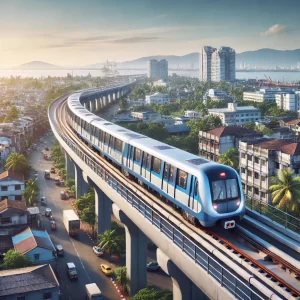Kochi’s Efforts in Promoting Sustainable Urban Transport

Kochi, often referred to as the “Queen of the Arabian Sea,” is one of the fastest-growing cities in South India. With its rapid urbanization and population growth, urban transport in Kochi has faced numerous challenges such as traffic congestion, air pollution, and lack of efficient public transport.
However, in recent years, the city has made significant strides toward sustainable urban mobility. Through green public transportation, smart traffic systems, and people-centric urban planning, Kochi is becoming a model city for sustainable urban transport in India.
Why Sustainable Urban Transport Is Important
Sustainable urban transport helps reduce:
-
Traffic congestion
-
Air and noise pollution
-
Greenhouse gas emissions
-
Dependence on private vehicles
It promotes public health, improves air quality, and supports low-carbon urban development. For a growing city like Kochi, it’s essential to create a clean, efficient, and inclusive transport system.
1. Kochi Metro Rail: Green Transit for the City
One of the most important steps in promoting sustainable urban transport in Kochi is the Kochi Metro Rail.
Key Features of Kochi Metro:
-
It is India’s first metro project with a dedicated Water Metro system.
-
Powered partially by solar energy.
-
Designed with energy-efficient technologies.
-
Features facilities for persons with disabilities, making it inclusive.
The Kochi Metro has helped reduce the number of vehicles on the roads, easing traffic congestion and reducing pollution.
2. Kochi Water Metro: India’s First of Its Kind
The Kochi Water Metro is a game-changer in green urban mobility. It connects islands and the mainland using electric-powered boats.
Benefits of Water Metro:
-
Zero-emission transport across waterways.
-
Reduces road traffic by offering a reliable alternative.
-
Connects underserved communities.
-
Encourages eco-tourism and sustainable development.
This innovative public transport system reflects Kochi’s commitment to multi-modal sustainable transport.
3. Non-Motorized Transport (NMT) Initiatives
Kochi is working to improve its non-motorized transport infrastructure, which includes walking and cycling. The city is part of the Smart Cities Mission, under which it has:
-
Developed dedicated cycle tracks and footpaths.
-
Launched a public bicycle-sharing system called Kochi Cycle.
-
Promoted pedestrian-friendly zones.
Encouraging people to walk or cycle short distances helps reduce dependence on cars and supports healthier lifestyles.
4. Electric Vehicles (EVs) and Charging Infrastructure
Kochi is promoting the use of electric vehicles (EVs) by:
-
Encouraging electric auto-rickshaws and e-buses.
-
Setting up EV charging stations across the city.
-
Offering incentives for EV adoption.
The Kerala State Electricity Board (KSEB) and Energy Management Centre are working together to build the infrastructure needed for widespread EV use.
5. Smart Traffic and Urban Mobility Planning
Kochi has introduced smart traffic management systems to improve traffic flow and reduce emissions.
Smart Features Include:
-
Real-time traffic monitoring
-
Adaptive traffic lights
-
Integrated public transport apps
-
GPS-enabled public buses
These technologies ensure smoother commutes and help citizens choose the most efficient and least polluting transport options.
6. Integrated Public Transport System
To promote seamless commuting, Kochi is building an integrated public transport system. This system allows passengers to switch easily between:
-
Metro rail
-
Water Metro
-
Buses
-
Auto-rickshaws
-
Bicycles
Single-ticketing systems and real-time information apps are being developed for better connectivity. This makes public transport more attractive than using private vehicles.
7. Public Awareness and Citizen Engagement
Sustainable urban transport is not only about technology—it also depends on people. Kochi regularly conducts:
-
Awareness campaigns on car-free days
-
Workshops on cycling and walking benefits
-
Clean air initiatives
Residents are encouraged to use public transport, reduce car use, and support green commuting options. Local communities play a vital role in making the city’s mobility future-ready.
8. Support from Government and International Agencies
Kochi’s sustainable transport initiatives are supported by various organizations, including:
-
Government of India’s Smart Cities Mission
-
United Nations Environment Programme (UNEP)
-
German development agency GIZ
-
Asian Development Bank (ADB)
These partnerships help provide funding, technical support, and international expertise to improve Kochi’s urban mobility infrastructure.
9. Challenges in Sustainable Urban Transport
Despite great progress, Kochi still faces challenges:
-
Traffic congestion during peak hours
-
Inconsistent last-mile connectivity
-
Limited awareness in rural and semi-urban areas
-
Funding and maintenance issues
Ongoing efforts and proper coordination between agencies are needed to address these challenges and create a resilient transport system.
Conclusion
Kochi has taken impressive steps to promote sustainable urban transport. From the Kochi Metro and Water Metro to electric vehicles and pedestrian zones, the city is creating a future where mobility is clean, affordable, and inclusive.
With continued investments, citizen participation, and government support, Kochi is set to become a model city for green mobility in India.
0 Comments